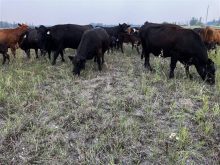After years of great crops farmers were reminded they can fail, says Manitoba lawyer and farmer John Stewart.
Unfortunately for some, they contracted more grain than they grew.
“What has happened is that farmers have become very cavalier,” Stewart said in an interview Oct. 21. “With modern seeding practices and modern equipment, with new genetics, most of the guys in the field today don’t remember a (drought) year called 1988. You’re sitting there saying to yourself, ‘there is no way I can get less than 25 bushels of canola per acre,’ or 15 or whatever the number was, and it can happen. It can happen. This is called farming and everybody knows it. ‘Well, it can’t rain that little.’ Yeah, it can. It has done it before. This isn’t something different this year. This is just history repeating itself.”
Every contract is different but generally they are valid, said Stewart, a partner with the Winnipeg firm D’Arcy & Deacon LLP.

“God knows there is a lot of hurt out there… and nobody wants to be mean and pile on and make things worse than they already are, but at the same time, a contract is a contract,” he said. “For every farmer who wants to get out of it there’s a processor that’s waiting for delivery.”
If grain companies wanted out of the contracts because prices went up, farmers would be upset, he said.
In future, farmers need to remember crops fail and consider using futures and options to lock in prices rather than only delivery contracts, Stewart said.
“The hard part when you’re signing delivery contracts is to keep in mind that you have to deliver,” he said. “That’s why it’s called a delivery contract.”
Read Also

Students push for Manitoba road upgrades
Manitoba’s lack of higher-rated RTAC roads creates irritating highway detours and weight restrictions for farmers, University of Manitoba students told KAP.
The shortfall some farmers face with their delivery contracts hasn’t been easy for grain companies either, Wade Sobkowich, executive director of the Western Grain Elevators Association, said in an interview Oct. 20.
“We can be right (legally) all we want but if the farmers have a problem it doesn’t matter if we’re right,” he said.
“No matter how you slice it there’s still the immutable fact that this is a supply chain and there are obligations each segment of the supply chain has with parties on either side. If grain companies are entering into export contracts they need to be able to have certainty they are going to acquire that grain in order to execute on that sale. It’s as simple as that.
“There is not a grain company out there that wants a producer to buy out of a contract. They want the grain because that’s the business they’re in.”
Meanwhile, grain companies and farmers are making progress on contract issues.
“Within the next month or so the vast majority should be dealt with,” Sobkowich said.
There was enough unpriced grain to meet the contract shortfalls, he added.
“So the grain company is kind of the meat in the sandwich. They don’t care what the replacement value is. It’s being set by the marketplace domestically based on what it takes to get those farmers who have the grain to part with it. It almost ends up being a wealth transfer from farmers who don’t have the grain to the farmers who do.”
Neither farmers nor grain companies want a repeat, Sobkowich said. Companies are looking at their contracts, but changes, if any, will be up to them, he said. If farmers don’t like the terms they don’t have to sign the contract.
Grain companies and farmers can use futures markets to protect against price changes, but a path to allow grain companies to offset what is ultimately the farmer’s production risk isn’t obvious.
“Farmers have to manage their risk,” Sobkowich said. “If after this year farmers decide to be more cautious when it comes to risk management that means less forward contracting, that means less tonnes grain companies are going to have locked up, that means a slower start to export sales program after the 2022 harvest.”
















